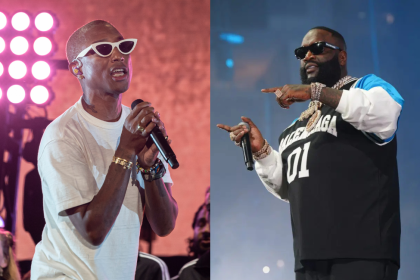 Cee Lo Green (“F— You”), Dallas Austin, Claude Kelly (Fantasia’s “Bittersweet”) and other songwriters participated in BMI’s annual “How I Wrote That Song” panel during Grammy week in Los Angeles. Moderated by Catherine Brewton, BMI’s vice president of writer and publisher relations in Atlanta, the event is a panel discussion and Q-and-A session with some of music’s most successful songwriters on the business side of the lucrative craft.
Cee Lo Green (“F— You”), Dallas Austin, Claude Kelly (Fantasia’s “Bittersweet”) and other songwriters participated in BMI’s annual “How I Wrote That Song” panel during Grammy week in Los Angeles. Moderated by Catherine Brewton, BMI’s vice president of writer and publisher relations in Atlanta, the event is a panel discussion and Q-and-A session with some of music’s most successful songwriters on the business side of the lucrative craft.
Green’s latest collaboration, “F— You,” which he performed at the event, is nominated for a Grammy this year, making the eccentric artist and what he had to say the highlight of the discussion. It seemed like every time Green took the microphone, lessons in business and life were shared.
When asked how he went from being an aspiring songwriter to a published and successful one, he responded, “It’s art imitating life … Songs have to resonate with people. If it doesn’t, you have some growing to do … You first have to be successful as a person before you can be successful as a personality … and that’s what it takes to make good music.”
Later, he shared that it’s important for writers to focus on their craft and master what moves them.
“As with all things, doing too many things at one time, something will suffer, unless you’re Prince,” he said. “Master the one thing that’s the most involuntary … obey the involuntary, the thing that you feel the most often … What you do should be concentrated but not contrived. ”
The Gnarls Barkley member was also asked how he’s been able to successfully cross over into non-minority focused airwaves and be embraced without altering his style, sound and creativity — a feat that few black artists have achieved.
“There are definitely walls that divide the genres and races, but when the music is unified, the people are unified. I’m inspired by an era in music called the golden ’80s when it was all-inclusive,” he said. “I liked Boy George and the Culture Club … I’m attracted to very strange and peculiar characters because I felt like that, alienated, very avant garde. Culture Club was symbolic of music that invited us all in and that music didn’t rule me out. When Boy George was writing, I’m sure he wasn’t saying, ‘I don’t want that guy to like this record,’ so the music that invited us all in as a ‘come as you are,’ it gave me the courage to be myself. So, fortunately, I’ve been able to make a career out of being myself … So before you say black or white, I’m not a black artist, I’m an artist.”







